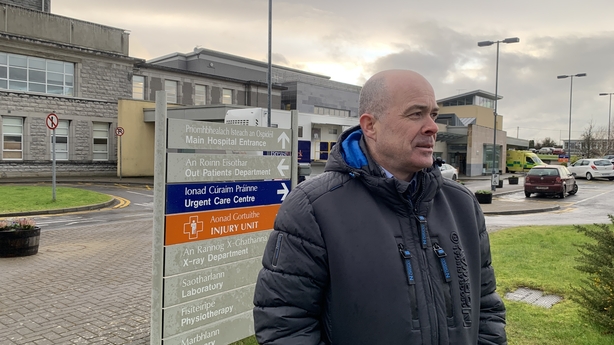The Health Service Executive is again being urged to use all available resources - including hospitals that have been downgraded in the past - to deal with the current overcrowding crisis.
Official figures show hundreds of patients are still on trolleys awaiting admission to hospitals around the country.
Pharmacies, meanwhile, are reporting shortages of over the counter medicines used to treat respiratory illnesses.
The number of patients waiting on trolleys in emergency departments last night was 535.
Figures from the HSE today put the number waiting in acute hospitals at 260, including children's hospitals. It compares to 398 at the same time yesterday.
The figures, taken at 8am, are more than 71% higher than this day last year.
The hospitals worst affected today are: Cork University Hospital with 23 waiting, St Vincent's University Hospital in Dublin with 20 waiting, and University Hospital Sligo with 19 waiting.
The number of patients in hospital with Covid is 577.
The HSE has been asked to approve the treatment of certain cases at Roscommon hospital, to ease pressure on emergency departments in the region.

Independent TD Denis Naughten said the Medical Assessment Unit (MAU) at the hospital can provide care for a range of illnesses and could be utilised to reduce waiting times at EDs in Sligo, Mayo and Ballinasloe.
His call comes after the HSE and the National Ambulance Service agreed a protocol to allow for the use of the assessment unit in Ennis for a similar purpose.
From next Monday, the MAU at Ennis hospital will be used to treat some patients who would typically be brought to University Hospital Limerick.
Paramedics, responding to 999 calls, will assess patients and then consult with doctors in Ennis, to determine whether their conditions meet clinical criteria for treatment there.
The initiative will operate between 8am and 6pm, when the MAU is open. It is being run on a pilot basis.
Deputy Naughten said it is imperative that staff and facilities in Roscommon hospital are used to help cope with the crisis in the health system.
He said that the MAU there could serve a particularly useful function in the treatment of certain respiratory conditions.
Deputy Naughten lost the Fine Gael whip 12 years ago, in a row over the decision to downgrade Roscommon hospital and close the ED there. He has successfully contested subsequent elections as an independent candidate.
The injury unit has operated at the hospital since the closure of the ED in 2011.
Separately, the HSE said it did not believe that the number of flu cases has peaked yet.
Pressure on the hospital network remains high with a surge in the number of patients seeking treatment, many of them for respiratory infections.
Following the worst week on record for hospital overcrowding, Minister for Health Stephen Donnelly said the focus over this, and coming weekends, would be on treating and discharging patients.
Staff across hospitals and community services have been asked to work additional hours today and tomorrow to increase the flow of patients through the system.
Read more:
Overcrowding crises: Why is the problem not yet fixed?
INMO threatens industrial action over hospital overcrowding
'57 hours with my coat for a pillow and an oxygen bottle'
HSE Chief Operations Officer Damien McCallion said it is hoped this will ease the pressure as he described the delays at hospitals as unacceptably long.
HSE interim Chief Executive Stephen Mulvany has said it is difficult to predict what the impact might be over the next week.
The HSE has also appealed to people to consider options other than the Emergency Department where possible, such as making an appointment with a GP or visiting a minor injury clinic.
However, some concerns are also being expressed over delays for GP visits in this current health crisis.
The situation in hospitals has led the Irish Nurses and Midwives Organisation to consult with its members on a campaign of industrial action.
Nurses say the overcrowding was avoidable and they will not endure this level of danger in their workplace.
Infrastructure to blame, says GP
Donegal GP and Chair of the IMO GP Committee Denis McCauley said he feels "worried" sending people into hospital as he thinks they are not going to get the care they should be receiving.
"It is sad and it is worrying," he added.
"That is no indictment of our colleagues and nurses in hospital. It is just that if you have somebody sitting on a chair for 40 hours their health outcomes are not going to be as good as if they were on the ward. So you are sending someone into hospital because you can't look after them but you know their care will not be as good as it should be."
Speaking on RTÉ's Brendan O'Connor, he said hospitals are doing their best but the infrastructure is to blame and that has been highlighted for many years to those responsible.
He said GPs' capacity to handle the demand from patients seeking treatment has been getting worse with a significant rise in respiratory illness adding to this.
"It is really difficult. We are the assessors of the respiratory issue. We try our best to assess these people, to look after them in primary care."
However he said there is "a body of sickness" that they cannot look after.
He said unless the bed numbers are increased this situation is going to be "the new norm".
Before, hospitals were able to cope but now they can't, he added.






